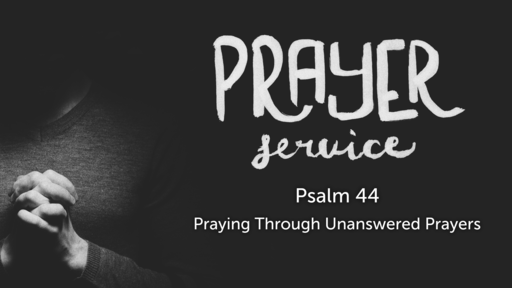Praying Through Unanswered Prayers
Notes
Transcript
Bethel Baptist Church,
Laramie, WY
Sunday, Mar 25, 2020
OUTLINE: WBC (Peter Craigie)
Pastor Nathan Sehi
When our prayers go unanswered, we often search for something
more then God’s perfect wisdom and will. Perhaps God doesn’t care. (v.9)
Perhaps God is not powerful enough. (v. 1-3) Perhaps it is our sin. Yet,
Unanswered prayer may simply be the perfect, good, and loving wisdom
of our God. (v. 22, 26) Or unanswered prayer may simply not be God’s
timing. (v. 26) This national Lament after a battle reminds us of God’s
power (v. 1-3), to place our trust in God and his wisdom (v. 22-26), and to
recognize God’s will has greater purpose. (v. 22, Romans 828, 36)
Psalm 44 – Praying Through Unanswered Prayer
Psalm 44 Summary: (Ross) Psalm 44 is a national lament, a prayer of the
people who shared a common plight. The lament in this case is that the nation
has suffered a harsh and humiliating military defeat because God had not gone
with them into the battle, meaning God had not answered their prayers for
victory. The psalm conveys the grief and sorrow over the devastating defeat as
well as the frustration and perplexity over God’s failure to help them.
Unanswered prayer is a problem that the psalmists frequently had to cope with;
it would have been easy for them to conclude that God did not care, or that God
was not able to deliver them, or that their sins had prevented his intervention.
But when they recalled God’s history of intervening in their lives to fulfill his
promises, they regained confidence to keep on praying in the anticipation of
deliverance. But they had to live with the tension that for some reason God was
not helping them even though he was the one who would help them.
1.
God’s past acts as basis for current confidence (44:1–8)
a. People: God’s acts in the past (v 1–3)
b. King: the appropriation of the past (v 4)
c. People: the normal grounds of confidence (v 5)
d. King: declaration of trust (v 6)
e. People: declaration of confidence (v 7-8)
2. The Lament (44:9–23)
a. People: lament of the present crisis (v 9–14)
b. King: declaration of shame (v 15–16)
c. People: declaration of innocence (v 17–22)
3. Concluding prayer (44:23–26)
King and people pray for deliverance and help.
Note: Craigie does a great job at tracing and explaining the transition
between singular and plural. This outline is the best reflection of this that I
have seen.
Questions
1) When God doesn’t answer your prayers – how do you process that
answer?
2) How do you struggle with unanswered prayers?
Author: Korahites (Plural)
Structure: A strophe Psalm
Devotional Outline: Message of the Psalms by Michael Wilkcock
1. What has God done? (vv. 1–3)
2. We are trusting (vv. 4–8)
3. What is God doing? (vv. 9–16)
4. We are obeying (vv. 17–22)
5. What will God do? (vv. 23–26)
3) In what ways does this passage help us understand unanswered prayers?
